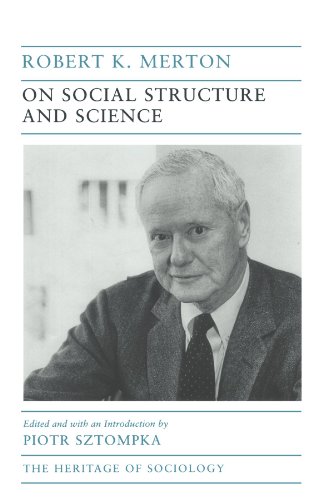Background
Robert K. Merton was born in Philadelphia, Pennsylvania, United States on July 5, 1910.



( From the names of cruise lines and bookstores to an Aus...)
From the names of cruise lines and bookstores to an Australian ranch and a nudist camp outside of Atlanta, the word serendipity--that happy blend of wisdom and luck by which something is discovered not quite by accident--is today ubiquitous. This book traces the word's eventful history from its 1754 coinage into the twentieth century--chronicling along the way much of what we now call the natural and social sciences. The book charts where the term went, with whom it resided, and how it fared. We cross oceans and academic specialties and meet those people, both famous and now obscure, who have used and abused serendipity. We encounter a linguistic sage, walk down the illustrious halls of the Harvard Medical School, attend the (serendipitous) birth of penicillin, and meet someone who "manages serendipity" for the U.S. Navy. The story of serendipity is fascinating; that of The Travels and Adventures of Serendipity, equally so. Written in the 1950s by already-eminent sociologist Robert Merton and Elinor Barber, the book--though occasionally and most tantalizingly cited--was intentionally never published. This is all the more curious because it so remarkably anticipated subsequent battles over research and funding--many of which centered on the role of serendipity in science. Finally, shortly after his ninety-first birthday, following Barber's death and preceding his own by but a little, Merton agreed to expand and publish this major work. Beautifully written, the book is permeated by the prodigious intellectual curiosity and generosity that characterized Merton's influential On the Shoulders of Giants. Absolutely entertaining as the history of a word, the book is also tremendously important to all who value the miracle of intellectual discovery. It represents Merton's lifelong protest against that rhetoric of science that defines discovery as anything other than a messy blend of inspiration, perspiration, error, and happy chance--anything other than serendipity.
http://www.amazon.com/gp/product/0691126305/?tag=2022091-20

(Sociology: A Brief but Critical Introduction offers a liv...)
Sociology: A Brief but Critical Introduction offers a lively, discursive and jargon-free introduction to sociology, accessible to the lay reader as well as to the student. It incorporates discussion of recent developments in both social theory and empirical social research - developments to which Giddens has directly contributed.
http://www.amazon.com/gp/product/015582001X/?tag=2022091-20

(Examines the interactions between sociological theory and...)
Examines the interactions between sociological theory and research in various approaches to the study of social structure, evaluating the limitations and functions of each
http://www.amazon.com/gp/product/0029211301/?tag=2022091-20

( Robert K. Merton is unarguably one of the most influent...)
Robert K. Merton is unarguably one of the most influential sociologists of his time. A figure whose wide-ranging theoretical and methodological contributions have become fundamental to the field, Merton is best known for introducing such concepts and procedures as unanticipated consequences, self-fulfilling prophecies, focused group interviews, middle-range theory, opportunity structure, and analytic paradigms. This definitive compilation encompasses the breadth and brilliance of his works, from the earliest to the most recent. Merton's foundational writings on social structure and process, on the sociology of science and knowledge, and on the discipline and trajectory of sociology itself are all powerfully represented, as are his autobiographical insights in a fascinating coda. Anchored by Piotr Sztompka's contextualizing introduction, Merton's vast oeuvre emerges as a dynamic and profoundly coherent system of thought, a constant source of vitality and renewal for present and future sociology.
http://www.amazon.com/gp/product/0226520714/?tag=2022091-20
Robert K. Merton was born in Philadelphia, Pennsylvania, United States on July 5, 1910.
Robert Merton was educated at Temple University and received his doctorate from Harvard University in 1936.
After being attracted to sociology by George E. Simpson, he studied with or was profoundly influenced by such thinkers as George Sarton, Pitirim Sorokin, Talcott Parsons, and L. J. Henderson. An instructorship at Harvard was followed by a professorship at Tulane University. From 1941 until his retirement in 1978 he was one of the key figures in the development of the Department of Sociology at Columbia University and in received national and international recognition for his contributions to sociological analysis.
As a consequence, Merton held a number of important positions, among them associate director of the Bureau of Applied Social Research at Columbia University, trustee of the Center for Advanced Study in the Behavioral Sciences at Stanford University (1952 - 1975), and president of the American Sociological Association (1957).
Though Merton studied a considerable range of social situations and social categories or groups, his basic and enduring contributions to sociological analysis consist of three complementary themes. First, human behavior can best be understood as embedded in social structures (groups, organizations, social classes, communities, nations) which simultaneously present opportunities and constraints to their members. Second, in varying degrees individuals confront differing clues and ambiguities in social demands, and thus humans develop mixed or ambivalent values and motives in their responses to others. Consequently, sociologists cannot focus on either formal, official patterns (rules, laws, etc. ) or the special features of individuals to understand the course and variations in important social structures. Third, because of this pervasive complexity in social experience, normal or "routine" social behavior typically generates multiple consequences, some predictable and desirable, but others largely unanticipated and even contrary to the intentions of many persons. On the whole, then, Merton advocated careful and yet imaginative study of social phenomena and cautioned against superficial, "common sense" investigations and slavish dependence on any technique of probing human social participation. More specifically, Merton combined study of actual (or historically significant) social organizations and groups with a focus on some limited but crucial and recurring problem in social structures-the so-called "middle range" problems and related explanations. One such focus was social specialization and related issues of differences in responsibilities, types and complexity of social contacts, and cultural interests. Merton distinguished "local" versus "cosmopolitan" types of leaders and showed how such differences underscored meaningful differences in influence. Similarly, Merton connected different levels of status with availability of different forms of personal influence ("reference groups") and linked the process of changing one's status-social mobility-with the selection of new reference groups ("anticipatory socialization") in the cases of soldiers, voters, and some nonconformists.
Another cardinal issue was socialization, the process of acquiring and sustaining legitimate roles in given social organizations. In this respect Merton studied medical students, intellectuals, scientists, bureaucrats, and various professionals. He and his associates gave much attention to the conflict between ideal goals and personal status concerns, and even to the "normal" inconsistency between accepted norms in academic training and the realities of "on-the-job" training of scientists and professionals.
Much of Merton's continuing sociological concern, however, centered on the twin sociological problems of social regulation and social deviation-each type of phenomenon necessarily conditioning the other. Merton inferentially demonstrated the basic fragility of such normal forms of social regulation as formal leadership, dominant cultural values, and professional standards. Furthermore, he pointed to such basic patterns as the variable consequences in behavior of imposing demanding objectives without providing suitable means; the fact that people often estimate their social opportunities and limitations not in objective terms, but in comparison with some desired level or with a self-selected "new" reference group ("relative deprivation"); and the special and virtually unshakable advantage of persons in favored social positions (the "Matthew Effect"), which dissipates attempts at equalization and implicitly undermines the legitimacy of those in positions of responsibility.
Merton immersed himself in the sociology of science, the study of major cultural and organizational factors in the work of scientists (principally in the physical and biological sciences). This involved careful analysis of the careers of Nobel laureates, the processes of competition among scientists, the connection between publication and scientific investigation, and the problematic nature of discovery and acceptance in the sacred realm of science. However, Merton also demonstrated his intellectual versatility in a delightful spoof of scholarship in his On the Shoulders of Giants. In retrospect, his entire intellectual career was notable for the flexibility with which he combined theoretical formulations, useful typologies and classifications, empirical investigations, and a concern for the practical implications of sociological work in modern society. His major works include Social Theory and Social Structure (1949), and The Sociology of Science (1973). His collection of essays, On Social Structure and Science, was reprinted in 1996. In the introduction, the editor of the collection, Piotr Sztompka, wrote that Merton's work had "opened up fruitful areas of inquiry along lines that he and generations of others would pursue for decades. "
He was a leading interpreter of responsible functional analysis, of major social factors in scientific development, and of underlying and unanticipated strains in modern society.
He received several prestigious awards: one for distinguished scholarship in the humanities from the American Council of Learned Societies (1962); the Commonwealth Award for Distinguished Service to Sociology (1970); a MacArthur Prize Fellowship (1983); and the first Who's Who in America Achievement Award in the field of social science and social policy (1984). In 1985 Columbia University honored him with the Doctor of Letters degree.
( From the names of cruise lines and bookstores to an Aus...)
(Sociology: A Brief but Critical Introduction offers a liv...)
(Examines the interactions between sociological theory and...)
(Book by Merton, Robert K.)
(Synopsis coming soon.......)
( Robert K. Merton is unarguably one of the most influent...)
He was also a leading interpreter of responsible functional analysis, of major social factors in scientific development, and of underlying and unanticipated strains in modern society.
Further Reading The central works of Merton's early period include Science, Technology, and Society in Seventeenth Century England (1938), Mass Persuasion (1945), Social Theory and Social Structure (several editions from 1949 to 1968), and the edited work Reader in Bureaucracy (1952).
Royal Swedish Academy of Sciences, National Academy of Sciences
In 1934 Merton married Suzanne Carhart.
